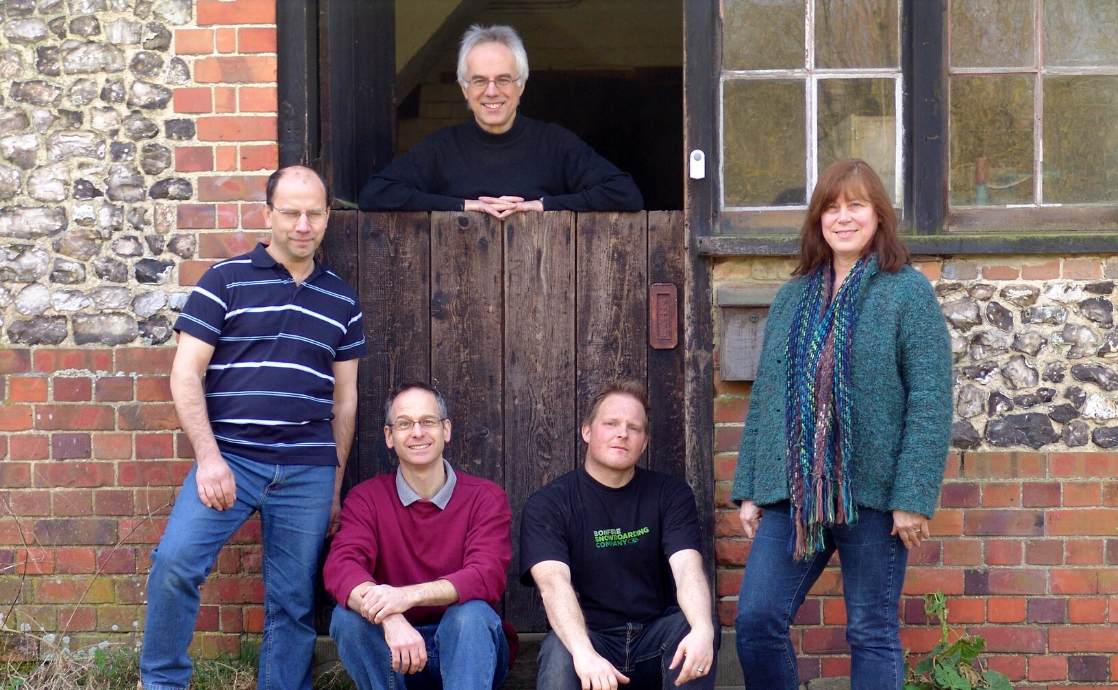The views expressed in our content reflect individual perspectives and do not represent the authoritative views of the Baha'i Faith.
As an owner of a crafts business, over a period of 30 years I’ve trained more than 20 aspiring furniture makers. Ten have since established their own workshop enterprises. Why did I do that?
Wasn’t I worried that I would train future competitors, or that the time and effort I spent training others would reduce the success of my own business?
No. In fact, I wanted every person who came to my workshop to have the opportunity to learn every aspect of furniture making – and learn the business side, as well. Much of what they absorbed came through the transparency of my business model – which attempts to run on the selfless Baha’i principles rather than the selfish tendencies of some business enterprises.
I had to learn everything I knew through trial and error and by staying in a continuous mode of learning, which taught me the willingness to share my knowledge without fear of giving away any hard earned “secrets.”
RELATED: The Human Soul as the Birthplace of Creative Ideas
Employing the Baha’i Principle of Consultation
I use Baha’i-inspired consultation for problem solving, and I learned to consult my team on many aspects of the business, as well.
For example, we consulted together on how long a new project might take when I prepared estimates; which also helped them in their ability to track how long each project was taking – and be rewarded with a bonus if they kept to the estimate.
In that same spirit of honesty and transparency, I also gave my employees full access to the business’s annual accounts. This transparency not only demonstrated my confidence in them, but allowed them to see that they were not being exploited in any way.
It took me 20 years to build a very mature team of four experienced craftsmen. Over time, each one had developed specific skills, and that combination of skills enabled me to delegate work according to their abilities. At that point, it was time to reward their mature experience with profit-sharing.
The Interdependence of Labor and Capital
The Baha’i teachings include profit sharing for employees, in the recognition that labor and capital are interdependent:
… the owners of properties, mines and factories should share their incomes with their employees and give a fairly certain percentage of their products to their workingmen in order that the employees may receive, beside their wages, some of the general income of the factory so that the employee may strive with his soul in the work.
It took me two decades building my business before I could introduce the first tier of a Baha’i-inspired profit-sharing scheme in my business. That eventually led me to form a limited liability partnership with each craftsperson being given a share in the business. I did this because I believed it was the right and just thing to do, but what I didn’t expect was the positive effect it would have on the viability of my business model; a subtle shift in motivation took place.
As a result, profits increased over successive years, and we all benefitted financially. I had now proved it was possible to create a craft business where we were all making a good living motivated by our passion, contrary to the doubters.
Craftswomen
Small craft workshops dedicated to pursuing excellence can be very socially insular, and mine was no exception.
In an age when women have still not achieved full equality in society and the workplace, there is still much work to do in human society. Out of 20 craftspeople I trained only two were women. This ten per cent figure also represents the percentage that enter craft education – but fewer stay in the industry because of misogynistic attitudes in the workplace.
There is a myth amongst both men and women that furniture making is necessarily a masculine occupation. I learned from the two women I trained – Lynn, a German engineer and Audrey, a French graduate linguist and my last trainee – that women can bring a refined sensibility to craftsmanship and teamwork.
In recent years, some workshops I know of have introduced a policy of training and employing fifty per cent women. Where women play an equal role, these workplaces have become healthier and more collaborative. In my experience I have also found considerable benefits in gender-balanced collaborations. For example, my business partner and wife, Esmyr, and I make better decisions through consultation. Our different perspectives reveal fresh insights and often moderate my tendency to be overly optimistic about plans. The Baha’i teachings make it clear that until women achieve full equality in every aspect of society there will continue to be detrimental consequences. The Universal House of Justice, the democratically-elected global leadership body of the Baha’is, has written:
The denial of such equality perpetrates an injustice against one half of the world’s population and promotes in men harmful attitudes and habits that are carried from the family to the workplace, to political life, and ultimately to international relations.
The crafts have become a growth industry in many places around the world, propelled by entrepreneurial craftspeople who, like me, want to make a living from their passion. Today many established workshops across the spectrum of crafts exist, including wood, glass, ceramics, and textiles. With this development, an unprecedented number of opportunities have opened up where aspiring craftspeople can train after graduating from college.
RELATED: Craftsmanship as Spiritual Practice
Despite this exciting development there is still a myth that it is not possible to survive just by making things by hand. All too often, well-intended parents and teachers discourage young people from apprenticeships or following vocational craft courses. Their advice is based on several misguided assumptions, including that learning a craft requires lesser ability and attainment than being a scientist, an architect or an engineer. Learning a craft involves a lifelong learning pursuit requiring what Professor Howard Gardner calls multi-intelligences.
In this series of articles I have described my life-long creative journey, inspired and guided by the Bahai Teachings. The crafts are no longer relics of a bygone age. They are now being reinvented in new forms through the creative energies released by Baha’u’llah’s revelation:
Through the mere revelation of the word “Fashioner,” issuing forth from His lips and proclaiming His attribute to mankind, such power is released as can generate, through successive ages, all the manifold arts which the hands of man can produce … No sooner is this resplendent word uttered, than its animating energies, stirring within all created things, give birth to the means and instruments whereby such arts can be produced and perfected. All the wondrous achievements ye now witness are the direct consequences of the Revelation of this Name.
The following prophetic words by Baha’u’llah have now become a reality: “In the days to come, ye will, verily, behold things of which ye have never heard before.”
Philip is a special advisor at Sylva Foundation, a UK forestry charity where he helped to establish an incubator model where over twenty-five independent craftspeople and furniture graduates now work; he continues his support through mentoring. At the beginning of 2021 Philip initiated a pilot entrepreneurial programme for Ugandan women and young people in collaboration with Janet, a Canadian Bahai, living in Uganda. Two young female Ugandan community leaders spearhead the mentoring programme.
















Comments
Sign in or create an account
Continue with Googleor